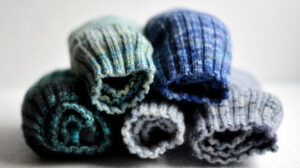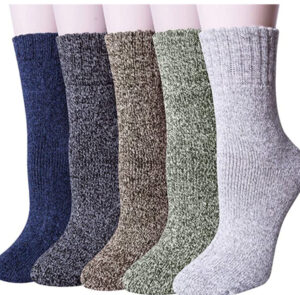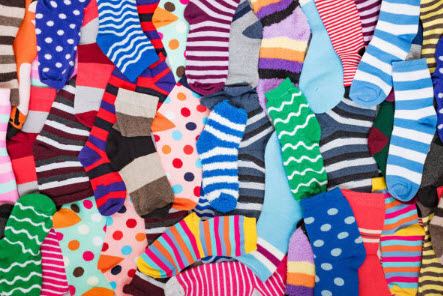 Unlike cotton, wool wicks moisture and sweat to keep your feet dry. Plus, it’s breathable, insulating and odour-resistant.
Unlike cotton, wool wicks moisture and sweat to keep your feet dry. Plus, it’s breathable, insulating and odour-resistant.
While it’s common to think of wool as cold-weather gear, it’s ideal for year-round adventures because of its temperature-regulating properties. It also keeps your feet warm and comfortable while hiking, running or working out.
Breathable
One of the most versatile and sustainable materials on the market, merino wool socks is soft and lightweight, keeps feet warm in winter and cool in summer, cancels out odours, and breathes incredibly well. This allows your socks to absorb lots of sweat but quickly transport that moisture away from your skin, keeping your feet dry and preventing fungal infections.

The breathability of merino wool makes it so comfortable to wear on long walks and hikes. This is a big difference from wearing cotton or synthetic blend socks that can feel heavy, clammy, and hot when trekking for miles.
Not only will your Merino wool hiking socks keep your feet nice and dry, but they’ll also help to prevent blisters from forming because they don’t rub and cause friction on your skin. Switching to Merino wool socks is a good idea if you’re prone to blisters on your feet.
In addition to breathing and wicking, merino wool also can repel water. This is because the natural wax coating on the Merino wool fibres helps to keep moisture from soaking into your socks. This is especially helpful on a rainy day when you want your feet to stay dry and protected from the elements.
Another great feature of merino wool is that it can be “unshrunk.” So if you accidentally wash your Merino wool socks at the wrong temperature or with a fabric softener, you can revive them and return them to their original size. While this isn’t an issue for most people, it’s something to be aware of to ensure your Merino wool clothing lasts for a long time.
Moisture-Wicking
 Merino wool can transport sweat away from the feet as a vapour, so your skin never feels damp, cold or clammy. This is because the fibres are super porous; the outside of a Merino wool fibre has tiny plates where moisture vapour can get trapped in between. This is a big difference from synthetic fabrics that are not as absorbent and instead wick moisture after it has turned into a liquid. The effect is that you feel less sweaty, even when active.
Merino wool can transport sweat away from the feet as a vapour, so your skin never feels damp, cold or clammy. This is because the fibres are super porous; the outside of a Merino wool fibre has tiny plates where moisture vapour can get trapped in between. This is a big difference from synthetic fabrics that are not as absorbent and instead wick moisture after it has turned into a liquid. The effect is that you feel less sweaty, even when active.
This moisture management is also helpful for preventing blisters because your feet are dryer, which reduces the friction between the skin and the fabric. The breathability of Merino wool socks is also essential for keeping your feet comfortable.
If you’re concerned about the sustainability of a Merino wool sock, look for a brand that uses organic and sustainable fibres in its production process. This ensures that the hose is not only environmentally friendly, but you don’t have to worry about your purchase impacting the animals who have grown the wool. A brand like Farm to Feet is a great option; their Merino wool socks are made in the USA from start to finish and support U.S. jobs.
Another great thing about merino wool is that it’s naturally antimicrobial and resists odour-causing bacteria. This is because it breathes, dries quickly, and does not retain odours like cotton and synthetic fabrics. This is an excellent feature in a hiking sock, especially for those who suffer from allergies and asthma, as it can help prevent the build-up of dust mite allergens. This can also make a pair of merino wool socks more comfortable while backpacking for long periods.
Odour-Resistant
Unlike synthetic materials that quickly trap odours, wool’s natural fibres help prevent nasty smells. The tiny microorganisms that live all over your body thrive in moist, dark environments, munching on the proteins found in sweat, emitting foul-smelling organic acids and growing. Merino socks help prevent these odour-causing bacteria from multiplying by keeping your feet cool, dry and smelling fresh.
Merino’s naturally breathable, moisture-wicking properties keep your socks dry and comfortable even on multiday backpacking trips. The wool also has a natural wax coating that repels water, so it beads and rolls off instead of soaking in. This makes the material more durable and lasts longer than socks from other materials, like cotton or nylon.
And because Merino is an eco-friendly and sustainable fabric, you can feel good about wearing it. The wool in these hiking socks comes from sheep that are shorn once or twice yearly without pain or discomfort to the animals. This sustainable and cruelty-free process reduces the need for artificial fabrics, such as acrylic yarn or polyester, that can be harder on your skin.
